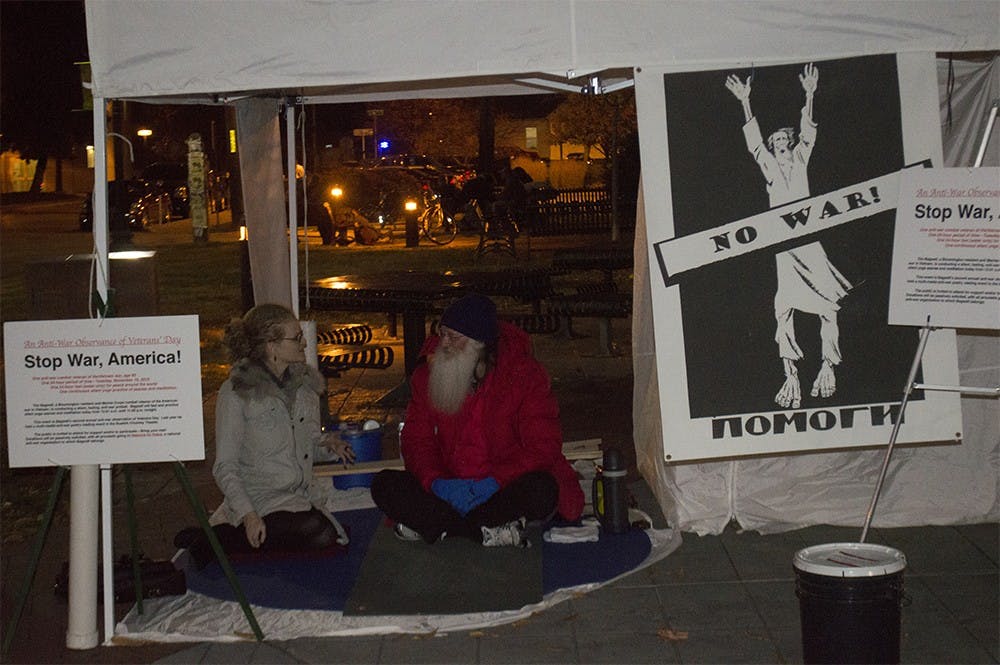At age 18, Bagwell entered combat as a soldier in Vietnam. For seven months he served in the region south of the DMZ — the demilitarized zone — and tried to survive as he fought. He said he and his fellow soldiers were forced to carry their dead and go without food because helicopters couldn’t get to them. He said their clothes rotted off their backs.
“It’s just a horrendous way to be a human being,” he said. “And that’s what I’m trying to stop.”
At midnight Nov. 10, Bagwell set up his white tent, blue mats and signs in Peoples Park and began a nearly day-long anti-war protest. In a puffy red coat, he sat and talked to anyone who came by. He said friends came to say hello throughout the day, and strangers walked up to listen to his words. Passersby waved or flashed peace signs as they strolled past.
“My original goal was to do a 24-hour silent fast, but then I decided that I didn’t want to be silent. I wanted to talk to people,” he said. “But I haven’t eaten all day.”
Bagwell said he hopes to open people’s minds to a perspective different from what most Americans have about war. A majority of Americans are skeptical about U.S. involvement in conflicted areas but still want the American military to be a leading power, according to the Pew Research Center.
Many veterans won’t agree with his view that war should end, he said, adding that anti-war veterans are rare. Most veterans and soldiers see merit in their actions, he said.
“They may be frustrated that war is seemingly endless, but they will not step out of their comfort zone to find out why it continues to exist or what they can do to make it stop,” Bagwell said.
In 1968, Bagwell enlisted in the Marine Corps. Typically, a tour lasted 13 months, but Bagwell said he was pulled out six months early as then-president Richard Nixon attempted to “Vietnamize” the war by replacing American soldiers with Vietnamese counterparts.
After about a month at home in California, Bagwell was sent to the Marine Corps Headquarters in Washington, D.C., where he helped with weekly parades at the U.S. Marine Corps War Memorial.
From there he went to the Pentagon to work as an orderly to the Chairman of the Joint Chiefs of Staff.
After joining Vietnam Veterans Against the War, Bagwell was investigated by the government and discharged from the Marine Corps. Along with other veterans in the group, he gave the medals he earned from the war back to Congress.
Bagwell said he has had post-traumatic stress disorder his entire adult life — it came after he left combat and before the disorder was recognized and included in the American Psychiatric Association’s Diagnostic and Statistical Manual of Mental Disorders in 1980.
“Most of the time, I didn’t know what it was,” he said, adding that war has always adversely affected soldiers after battle.
“One of the standard features of war is that it warps human minds because it is so ugly and so gruesome and so intentional and so vicious,” Bagwell said. “And I hate it. I detest it.”
Bagwell said he thinks it’s possible to end war. He has tried to heal with activities like yoga, and he said while his belief is “naïve” and “outlandishly delusional,” he still wants to change both humanity’s view of war and the United States’ military involvement in other countries.
“Maybe if I sit out here for 24 hours without eating anything, it’ll touch enough people that they’ll go around the other side of the world and communicate,” he said. “If half the world’s population agreed with me, war would end tomorrow.”






